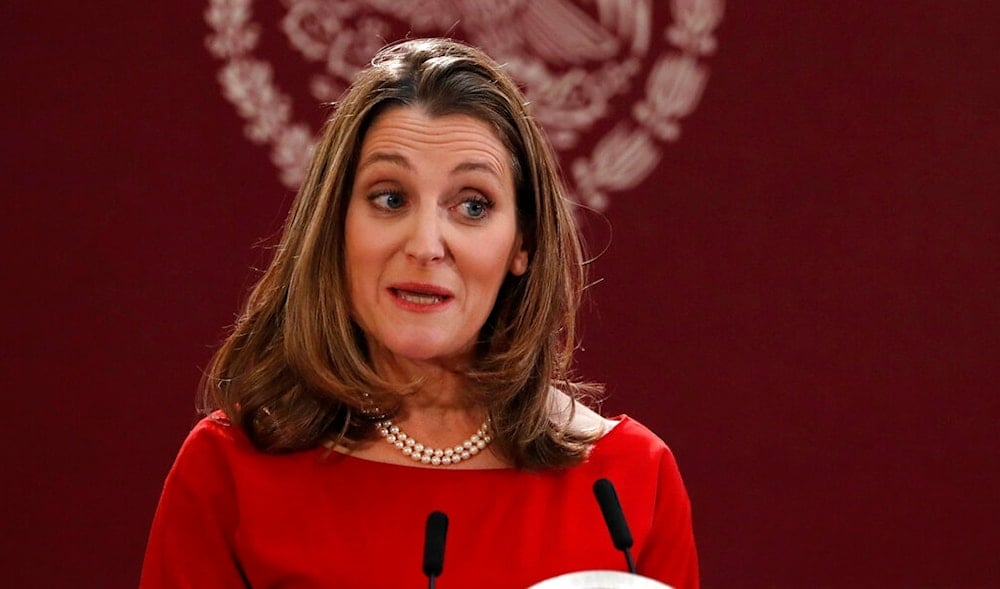Canada deputy PM resigns amid tensions with Trudeau over Trump tariffs
Chrystia Freeland has officially resigned from her cabinet position, triggering a series of responses and calls for the prime minister to follow her example.
-

Deputy Prime Minister of Canada Chrystia Freeland speaks during an event to sign an update to the North American Free Trade Agreement, at the national palace in Mexico City, on December 10, 2019. (AP)
Canada’s Deputy Prime Minister and Finance Minister, Chrystia Freeland, resigned amid escalating tensions with Prime Minister Justin Trudeau over the economic challenges that Donald Trump’s “America First” policies posed.
Freeland stepped down on Monday, only hours before she was set to release the country’s first economic plan ahead of the upcoming change in Washington's leadership, according to The Guardian. This left Trudeau without a key ally in his cabinet.
Since Trump was elected for his second term, the deputy prime minister mobilized and has been preparing a team of Canadian officials to face the challenges that could arise with the arrival of the new president.
It is worth noting that the diplomatic relationship between Canada and the US has been strained by Trump’s threat to impose a 25% tariff on all Canadian goods and services.
Her letter of resignation explicitly mentions that she and Trudeau have been at odds regarding the best course of action for Canada, warning him of the threat Trump's economic nationalism poses on the country, particularly the imposition of 25% tariffs on Canadian goods and services.
She also highlighted the importance of Canada maintaining its fiscal reserves, urging the country to keep its "fiscal powder dry" in preparation for the potential "tariff war" ahead.
"That means pushing back against ‘America First’ economic nationalism with a determined effort to fight for capital and investment and the jobs they bring. That means working in good faith and humility with the Premiers of the provinces and territories of our great and diverse country, and building a true Team Canada response," the letter read.
Freeland had been scheduled to announce the government's delayed fall economic statement on Monday, which was expected to include measures for increased enforcement at the US-Canada border. The statement was also set to outline policies aimed at encouraging business development and investment in Canada. However, it remains on hold until further notice.
Calls renew for Trudeau's resignation
Political analyst Éric Grenier from The Writ described Freeland’s resignation as a "clear rebuke" of the prime minister.
"Freeland was one of Trudeau’s first recruits when he became leader back in 2013. She’s always seemed to be a pretty loyal member of cabinet," Grenier noted, further highlighting that her resignation marks a rare phenomenon in Canadian politics, which indicates the severity of the issues within the government.
Meanwhile, Transport Minister Anita Anand also expressed shock amid hearing the resignation news.
Following Freeland's resignation, several Liberal MPs renewed their calls for Trudeau to step down, while Conservative leader Pierre Poilievre once again demanded an immediate election, declaring, "The government of Canada is spiraling out of control."
The byelection on Monday in the Cloverdale–Langley City district of British Columbia is seen as a key test of Trudeau's government’s popularity—one that analysts predict he is likely to fail.
Experts suggest that any contender would likely outperform Trudeau in the upcoming contest.
Calls for Trudeau's resignation have been mounting for months amid electoral setbacks. In October, Canada’s Liberal party, angered by Justin Trudeau, gave the prime minister an ultimatum: announce your decision regarding the possibility of remaining the party's leader or risk a caucus revolt.
During a closed-door meeting with Liberal lawmakers on Wednesday, 20 MPs, none of whom are cabinet members, urged Trudeau to step down ahead of what is expected to be a difficult election, The Guardian reported.
Since Justin Trudeau became prime minister in 2015, Freeland has proven herself to be a dependable and long-serving member of his cabinet. She is particularly recognized for her skillful renegotiation of the North American Free Trade Agreement with the first Trump administration, a deal that ensured continued Canadian access to the US market despite Trump's policies.
Read more: Justin Trudeau faces a summer marked by discontent: WSJ

 4 Min Read
4 Min Read








